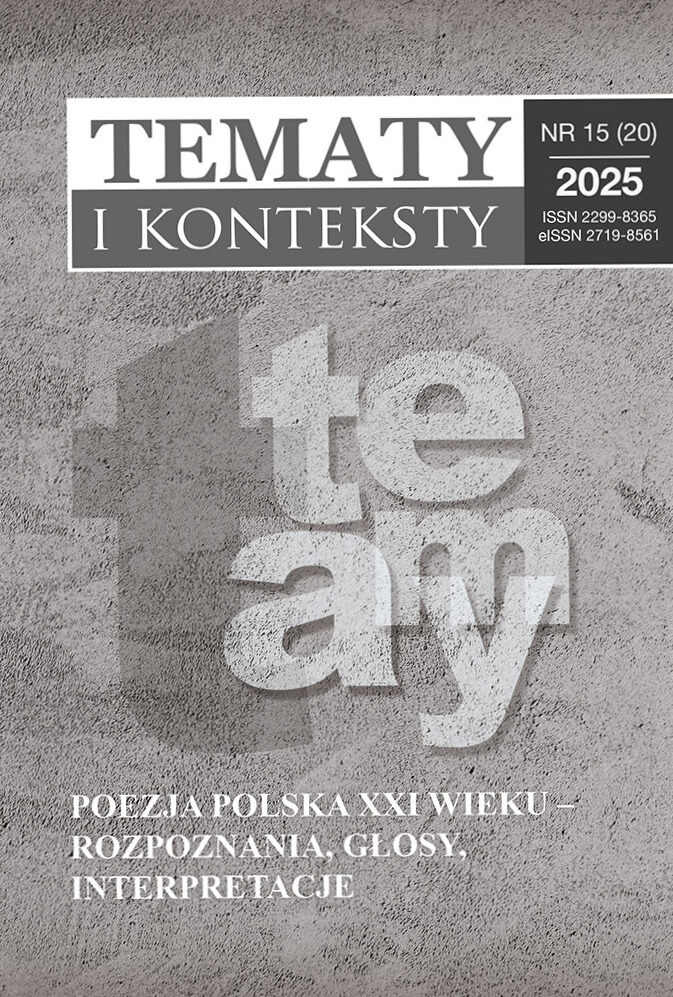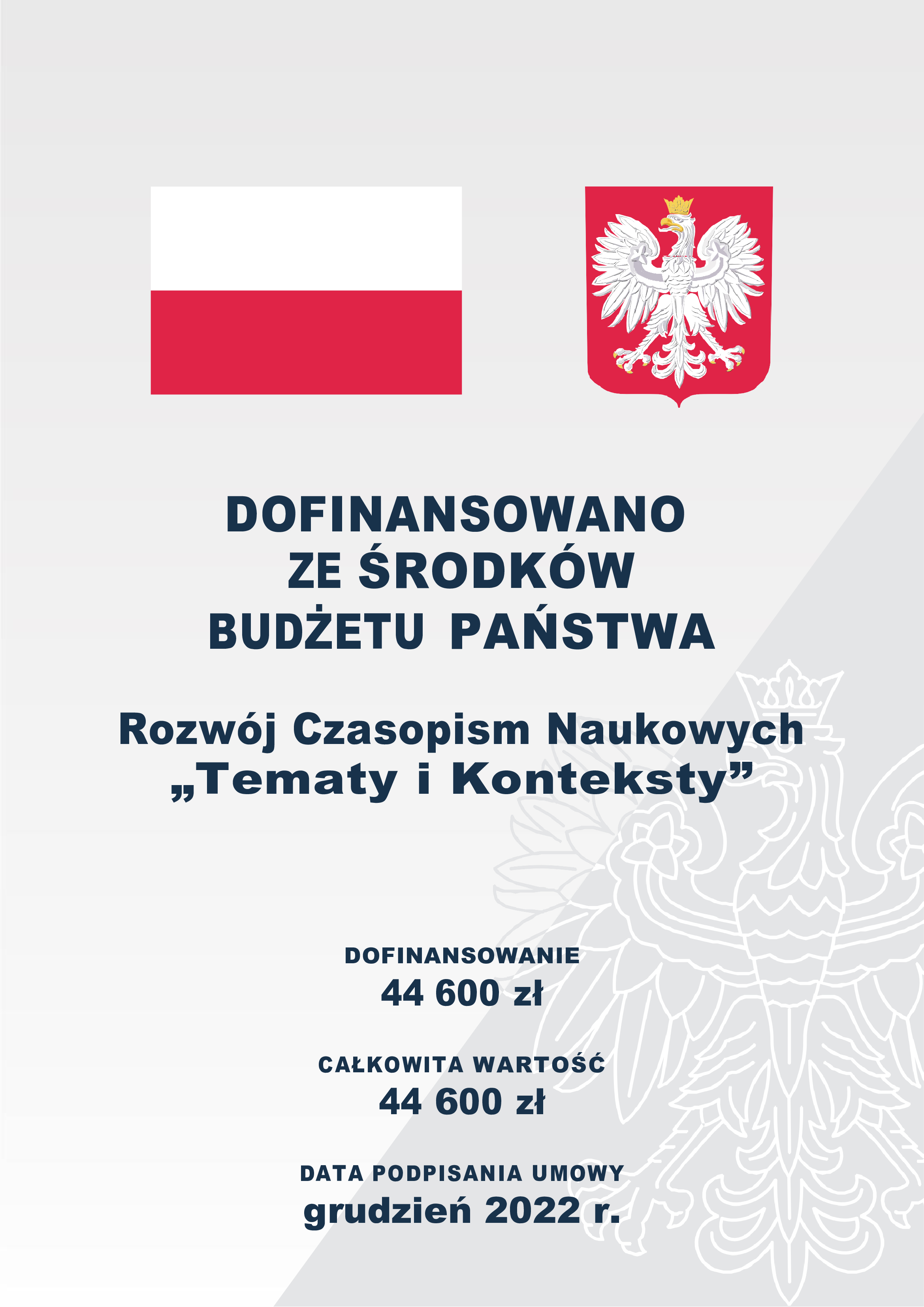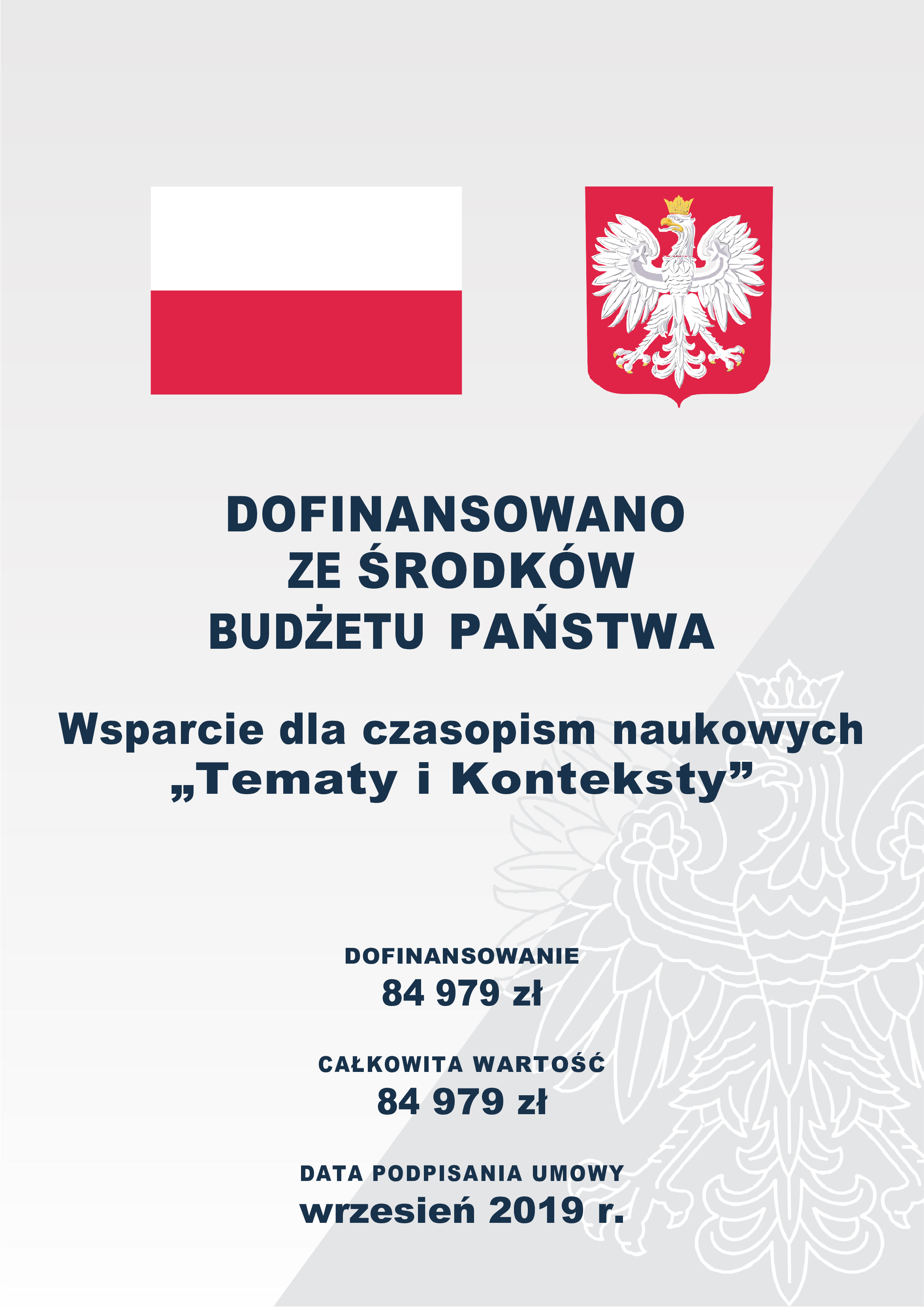Archives
-
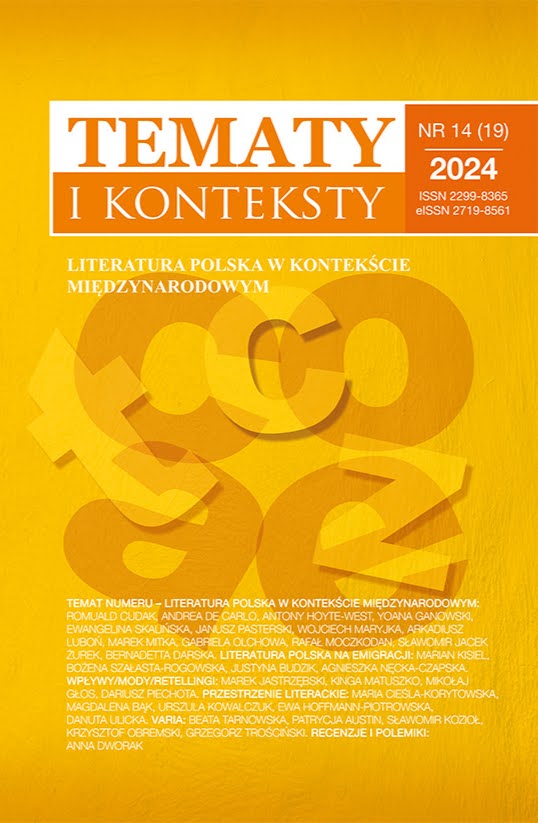
Polish Literature in the International Context
Vol. 19 No. 14 (2024)Ten numer „Tematów i Kontekstów” został poświęcony problematyce związków literatury polskiej XX i XXI wieku z innymi literaturami i szeroko rozumianym kontekstem międzynarodowym. Literatura polska wiąże się przede wszystkim z naszą historią, tradycją i kulturą literacką, odpowiada na wyzwania rzeczywistości, ale jest także ważnym ogniwem literatury europejskiej, czy szerzej, światowej, czerpie z jej dziedzictwa i tradycji literackiej. Równocześnie sama bywa źródłem inspiracji dla literatur obcojęzycznych, zwłaszcza europejskich. W tym znaczeniu jest jej integralną częścią składową. Szeroki, międzynarodowy kontekst pozwala na rzadziej podejmowany ogląd naszej literatury z różnych perspektyw badawczych, wyznaczanych takim właśnie współistnieniem i wzajemnymi relacjami. Dlatego w numerze tym zamieszczone zostały rozprawy i artykuły poruszające między innymi takie zagadnienia jak wpływ literatury światowej na literaturę polską (prądy, kierunki, dzieła autorów światowych), wpływ literatury polskiej na literaturę europejską/światową (dzieła autorów polskich), polskie dzieła na światowym rynku wydawniczym (tłumaczenia/, przekłady, wydania, recepcja za granicą, literatura polska a literatura żydowska i niemiecka, polska literatura emigracyjna/migracyjna (wpływ na literaturę kraju urodzenia i osiedlenia).
Co-funded by the state budget under the “Rozwój czasopism naukowych” (“Development of Scientific Journals” programme).
-
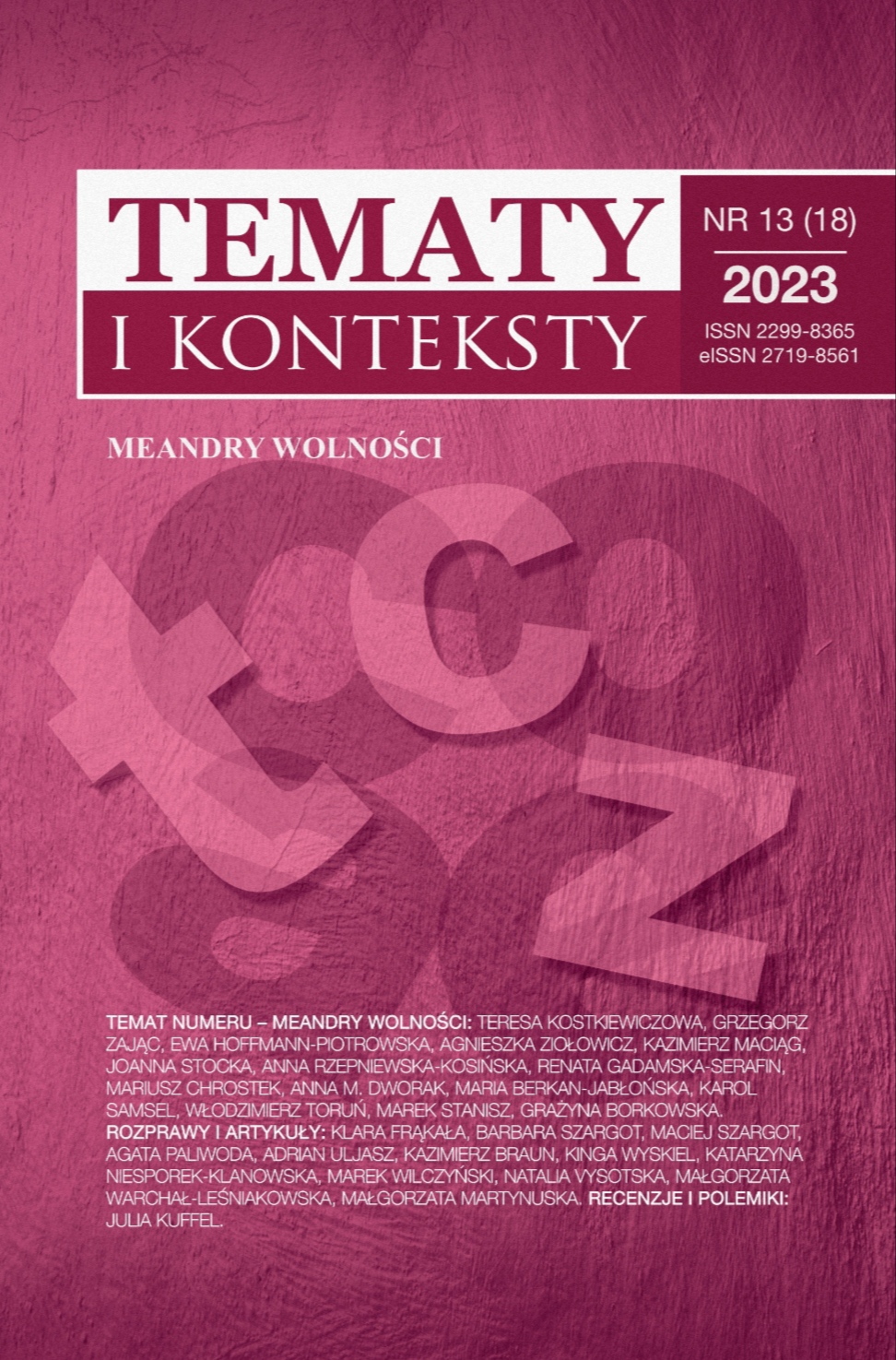
The intricacies of freedom
Vol. 18 No. 13 (2023)Co-funded by the state budget under the “Rozwój czasopism naukowych” [“Development of Scientific Journals] programme.
-
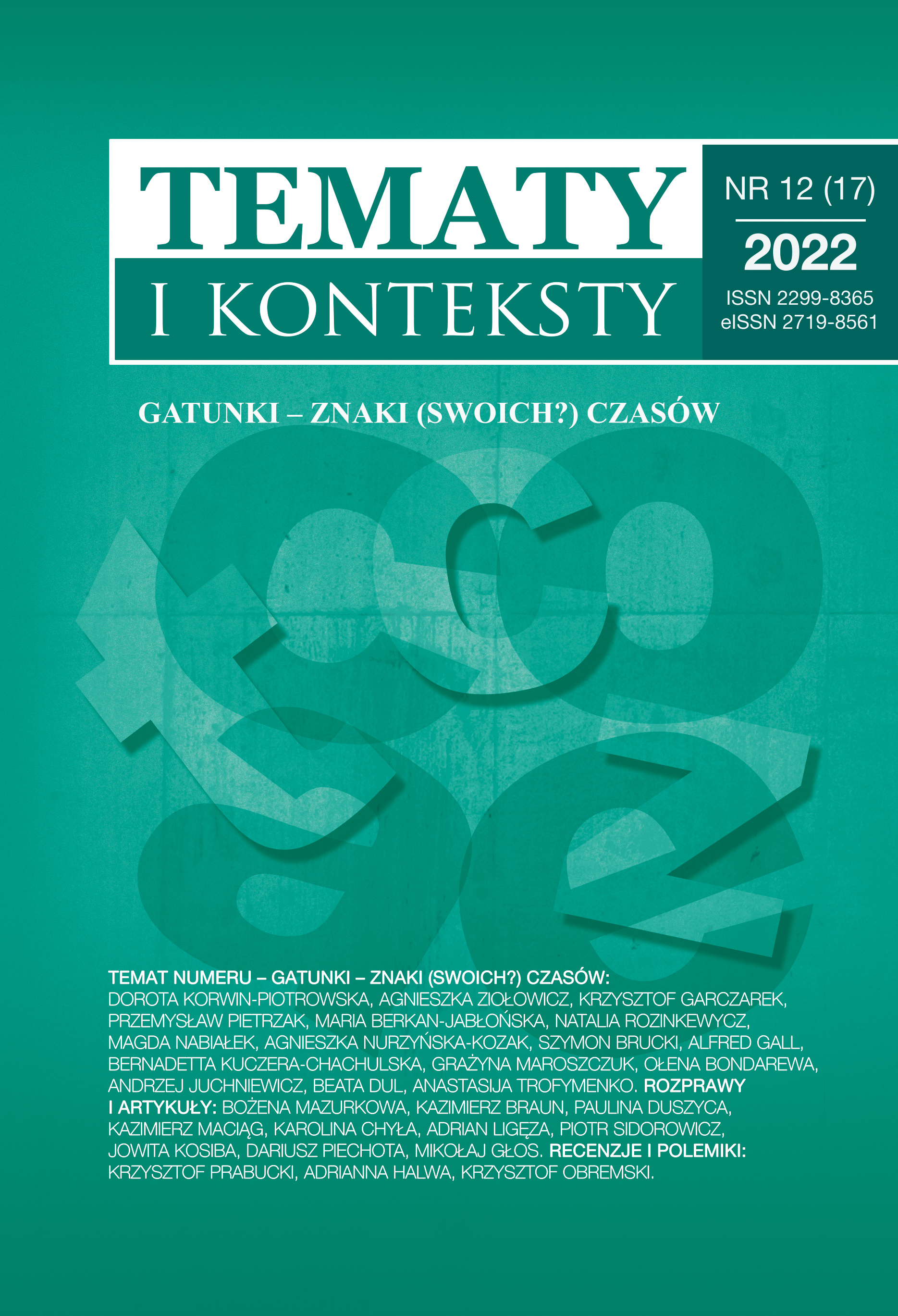
Genres – The Signs of (Their?) Times
Vol. 17 No. 12 (2022)The theme of the 2022 issue of “Tematy i Konteksty” is genre studies. This subdiscipline of poetics has, for the past hundred years, been accompanied by numerous question marks. Sometimes rightly accused of dogmatism and a rigid, normative character, it has been rejected, rebuilt, modernized, and "postmodernized" — and yet, despite predictions of its demise at the end of the previous century, it continues to endure. How? Suspended between reconstructing the past and describing the present, between envisioning a Catalogue of Forms in a literary Scriptorium and observing, listening to, and describing in real time what is currently being created in the "textual world" and beyond, where the text is but a part of a larger multimodal project. Genre studies, after all, is as fluid as literature itself — its boundaries seemingly nonexistent, yet its territory shifting with each era. It continues to fascinate through the multitude of forms and conventions it recalls and discovers, and through its expansiveness in annexing ever-new areas. It offers satisfaction both to literary scholars — collectors and antiquarians — and to theorists of various orientations, as well as to explorers of nonstandard research "finds" in the form of one-off, "authorial" creations — unique and vibrant with new, unknown life. As long as literature exists, so too will reflection on its genological or "agenological" modes of being — that is, on the ways in which streams of experience and reflection, words and images, are organized into larger, more or less complete wholes.
-
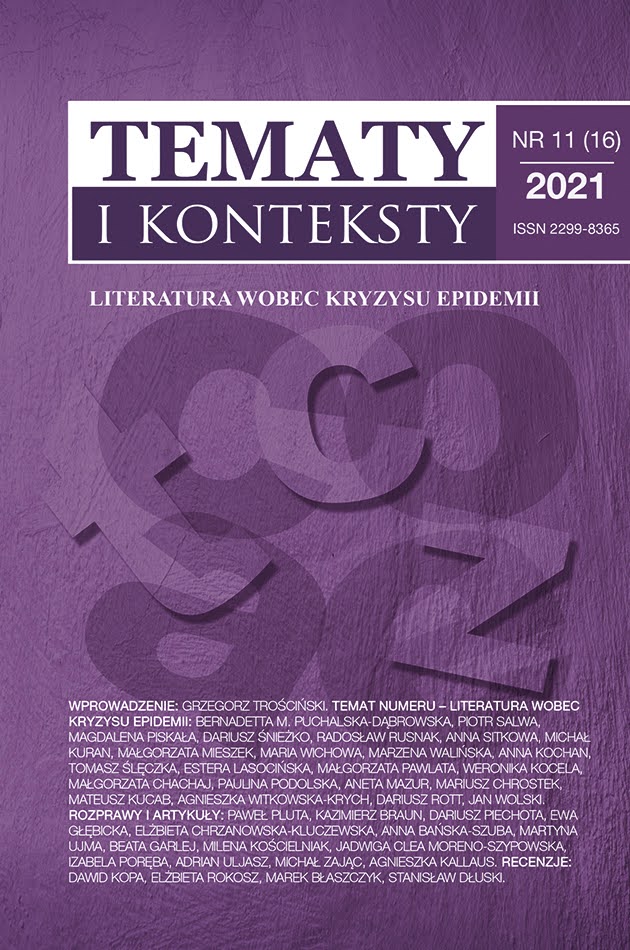
Literature in the Face of Epidemic Crisis
Vol. 16 No. 11 (2021)The recent experience of the COVID-19 epidemic — global in scope, pandemic in nature, and producing a wide range of effects felt by all of humanity, from medical to economic, cultural, and civilizational, as well as on individual, social, and national levels — compelled both immediate action (an urgent task for medical professionals) and deep reflection on the epidemic situation. This reflection extends not only to the fields of epidemiology and virology but also to religion, axiology, and ontology, alongside the discussions dominating all forms of media, clearly visible in journalism, public statements, opinions, reports, interviews, and more. The authors of the studies published in this issue, addressing epidemic-related issues through representative literary and cultural examples from several centuries of Polish and world history — from the Middle Ages to the present day — have presented diverse approaches to the central theme. They have subjected literary texts to scholarly analysis from historical, literary-historical, philosophical, sociological, and psychological perspectives. Despite the diversity of the works analyzed, spanning several centuries, the studies make it possible to identify the laws governing the epidemic universe and to observe enduring mechanisms amid the ever-changing realities of civilizational development.
-
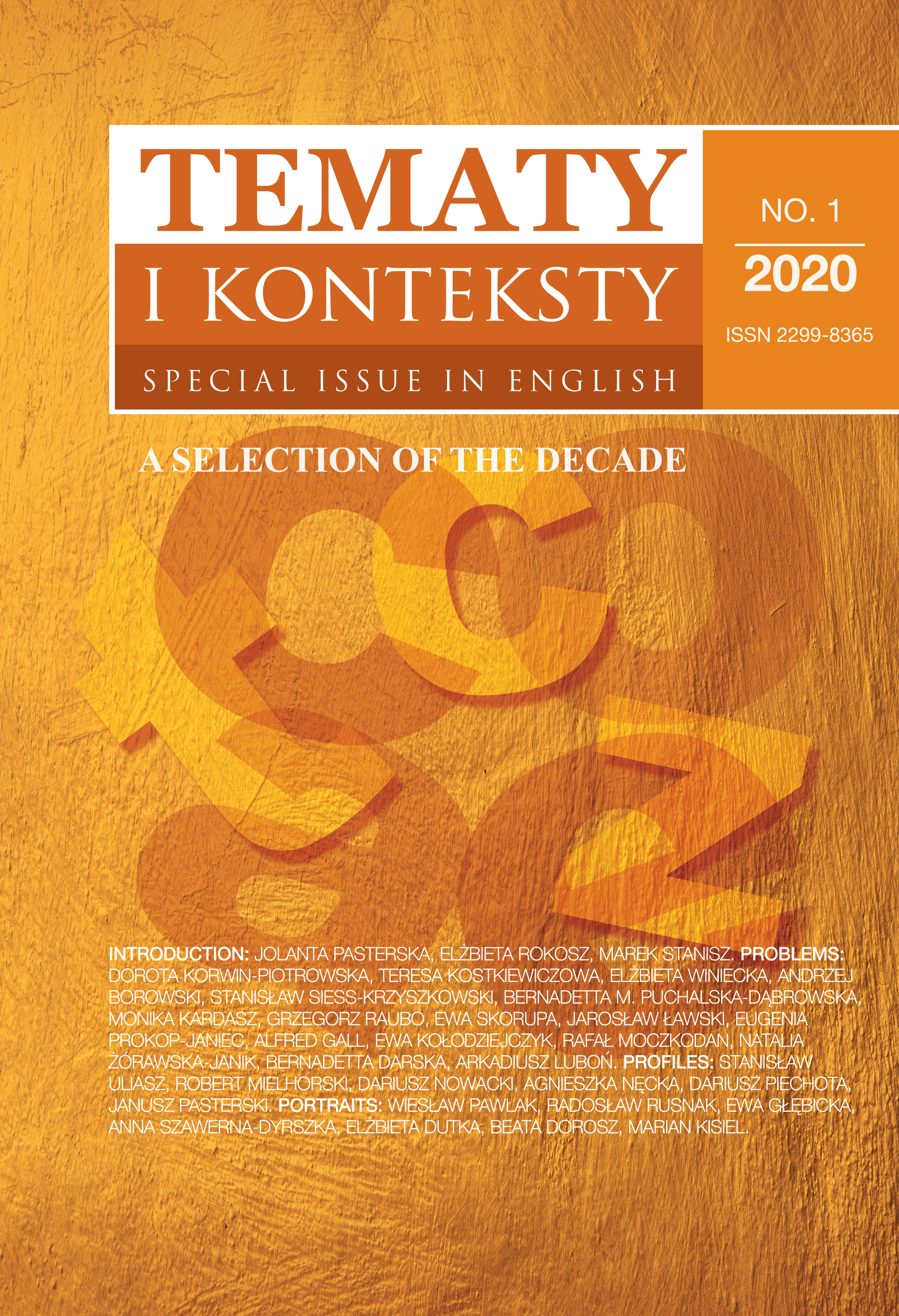
Special Issue in English, No. 1: A Selection of the Decade
No. 1 (2020)A Selection of the Decade is a special issue of Tematy i Konteksty, a literary studies journal which has been published in Poland since 2011. This special issue is a collection of articles that were published in Polish in former issues of the journal and have now been translated into English to reach English-speaking readers.
Edited by: Jolanta Pasterska, Elżbieta Rokosz, Marek Stanisz
Translators: Łukasz Barciński (University of Rzeszów, Poland), Piotr Cymbalista (University of Rzeszów, Poland), Agnieszka Grząsko (University of Rzeszów, Poland), Karolina Puchała-Ladzińska (University of Rzeszów, Poland), Elżbieta Rokosz (University of Rzeszów, Poland), Edyta Wiecławska (University of Rzeszów, Poland)
ISSN: 2299-8365, Number of Pages: 554, Format: B5
The journal has been included in the „Wsparcie dla Czasopism Naukowych” program [Support for Scientific Periodicals] of the Polish Ministry of Science and Higher Education in 2019–2020 (Contract No. 376/WCN/2019/1).
-
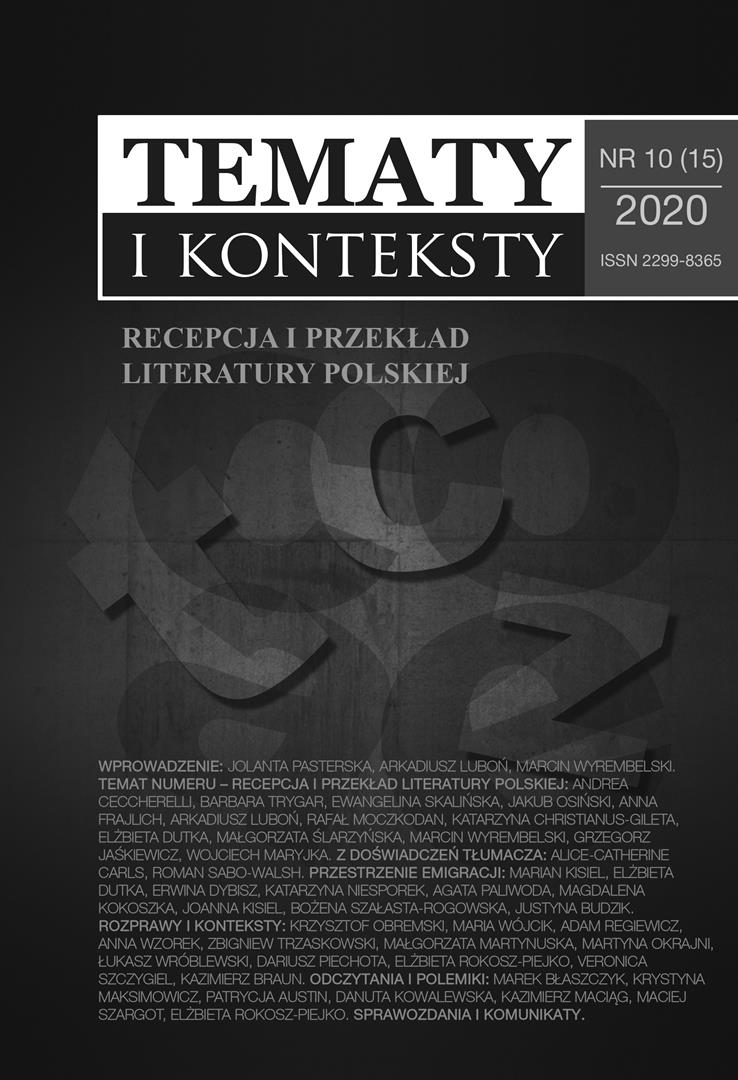
Recepcja i przekład literatury polskiej
Vol. 15 No. 10 (2020)Interest in reception of Polish literature translated into foreign languages has increased in recent years among not only academic researchers but also publishers, literary critics and readers as well. Both successes of contemporary Polish writers abroad and the endeavors of cultural institutions aimed at promotion of Polish literature in other countries inspire discussions centered on the issue of selection and adaptation of the most representative, unique and/or attractive for foreign readers texts, originally written in Polish. The tenth issue of „Tematy i Konteksty” also addresses these questions, collecting papers focused, among others, on modern translator’s cultural role and status, standard or unconventional techniques and methods applied in literary translation, particular transfers of various artistic texts from Polish into other languages and modes of their reception within target cultures.
Articles collected in the volume answer numerous questions related, for instance, to the ways in which foreign readers respond to writings by Polish authors or to the fields of discourse texts of Polish origin enter as an effect of the set of translational transformations. These transformations result from a variety of factors, such as translator’s idea of equivalence, his/her professional and social position, editorial strategies or even detailed choices of lexical items crucial for the preconceived meaning of the text. The articles discussing and analyzing such issues unveil the secret of supralocal successes of certain Polish writers and clearly indicate the importance of translator’s work for their achievements. -
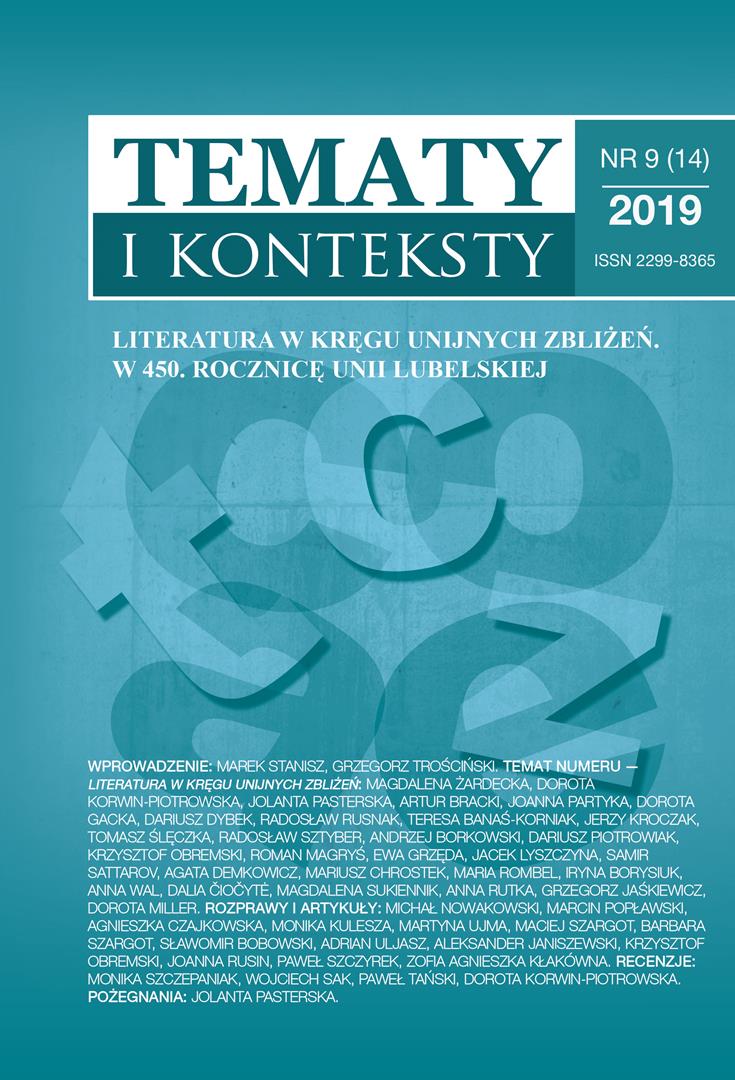
Literature in the Context of Unification Initiatives to Commemorate the 450th Anniversary of the Union of Lublin
Vol. 14 No. 9 (2019)Every single union is unique in itself, as the very word etymologically indicates the act of uniting states, territories, international organizations, associations at a specific moment of history. This act is determined by a variety of factors: political, military, social, economic, religious, etc., as well as various interests of personal, dynastic, state, national or ideological nature (although the latter may sometimes be affected by utilitarian aspects). The extraordinary character of a union encompasses various dimensions, however, they are all subjected to the ideas of peace, agreement, mutual cooperation, creating and developing common values in the atmosphere of trust and working towards the common good. As any other agreement assuming closer relations between its members, a union creates a space for partnership and compromise, at the same time constituting a meeting ground for the interests of all the parties involved. This is because every union stems from a long-lasting dream about the world without borders and divisions, which would be a home to everyone, open and welcoming also for those who are different.
-
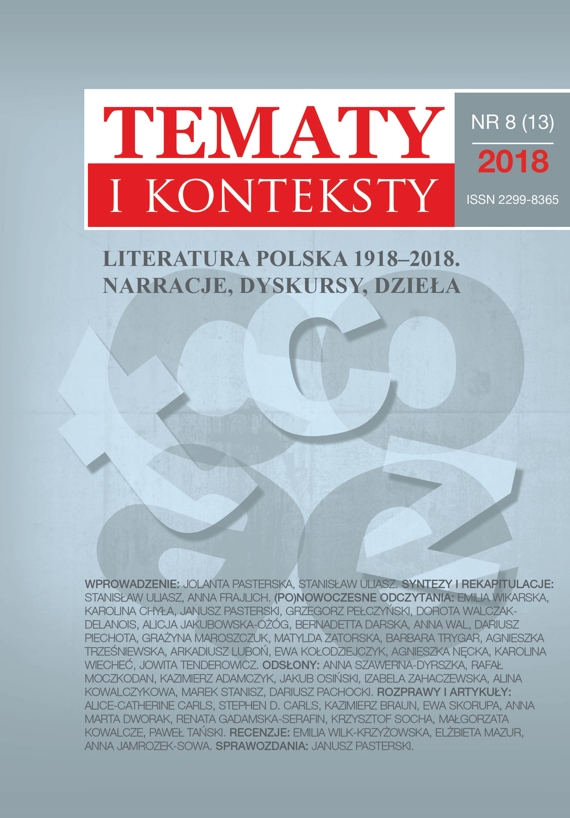
Polish literature 1918–2018. Narratives, discourses, works
Vol. 13 No. 8 (2018)The year when the eighth number of “Themes and Contexts” is published,nis unique because we celebrate the 100th anniversary of the restoration of Poland’s sovereignty. It is also an opportunity to look at the contractual century of the “new” Polish literature. In this context of “duration and changeability”, it is important to discuss the work of outstanding poets and writers of the last century, as well as interpretations of important works. This is a convenient time both for reappraisals and for new interpretations seen from a variable, literary perspective. Thinking about Polish literature in 1918 2018, we had in mind the attempts to establish the hierarchy of the most important literary phenomena in the context of political, constitutional and transformational changes. These issues are discussed in the first group of texts entitled Synthesis and reappraisals. Another group of problems connected with the subject of (Post)modern reading introduces the circle of detailed considerations. The research of Polish literature of the last century is conducted by the authors in two ways. In the first one, the researchers adopted a comparative perspective and analyzed new works compiled with works from the interwar period. The second variant is dominated by the synchronous perspective, in which the authors’ attention is focused on the originality of the latest works and contemporary methodologies of studying a literary work and “modern” contexts (social-media, pop-culture, hypertext, blogosphere, etc.). The study of contemporary literature in the context of the works of the past century has resulted in interesting literary and cultural findings. This section, titled Views, is a voice of researchers asking for the restoration of forgotten literary writings, artists (Gniatczyński), single works. The articles collected in the volume authorize the conclusion that these conventional chronological frames cover many literary phenomena, as well as the names of writers who created and create an image of Polish literature of the last century.
-
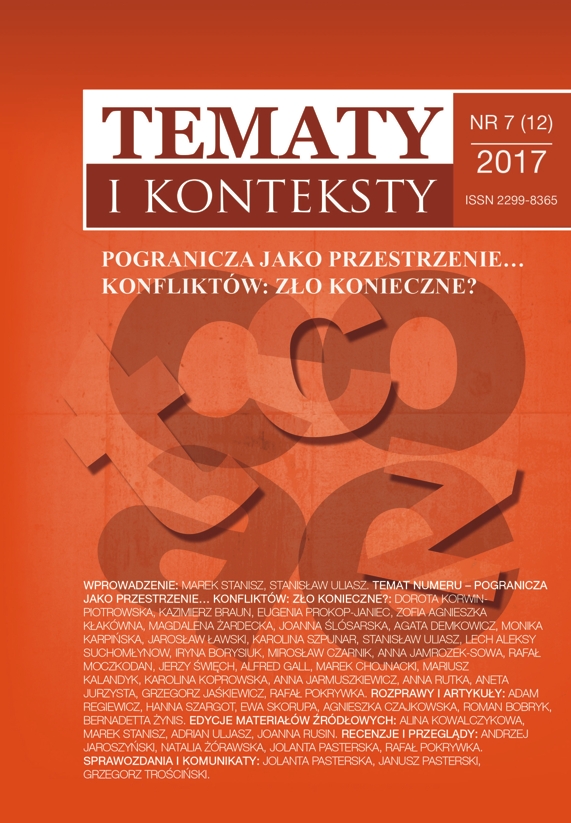
Borderlands as space of... conflicts: necessary evil?
Vol. 12 No. 7 (2017)Presented article is an introduction to the discussion devoted to literary representations of borderland conflicts. Borderland understood as an imagined sphere of confrontation between various interests and social groups is presented in literature not only as space of peaceful coexistence of diverse communities and varieties but also as the domain of conflict and confrontation of social groups and individuals. It seems that so far the images of borderland conflicts have not been sufficiently reflected in literature studies. This article is an attempt to systematize detailed issues connected with these problems.
-
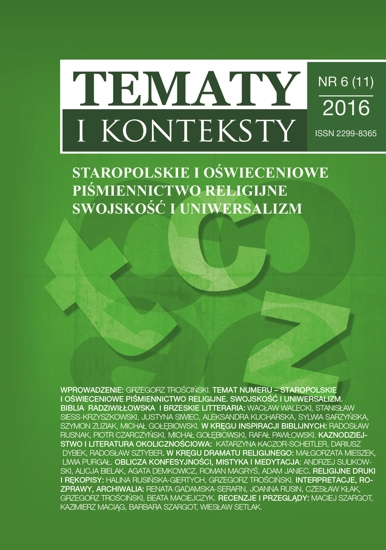
Familiarity and Universalism – Selected Issues in Old Polish and Enlightenment Religious Literature
Vol. 11 No. 6 (2016)Old Polish and Enlightenment religious literature is a fascinating area of research in past culture. It is still too early to claim comprehensive knowledge of it even though systematic work has been in progress for decades. The present issue of “Tematy i Konteksty” is the second collection of papers focused upon this current in old Polish literature. This issue is devoted to the relations of familiarity and universalism in Old Polish and Enlightenment religious literature. The main emphasis in the papers has been placed upon the Brest Bible and biblical inspirations, homiletics and occasional literature, religious drama, religious confession, mysticism, meditation, religious prints and manuscripts.
-
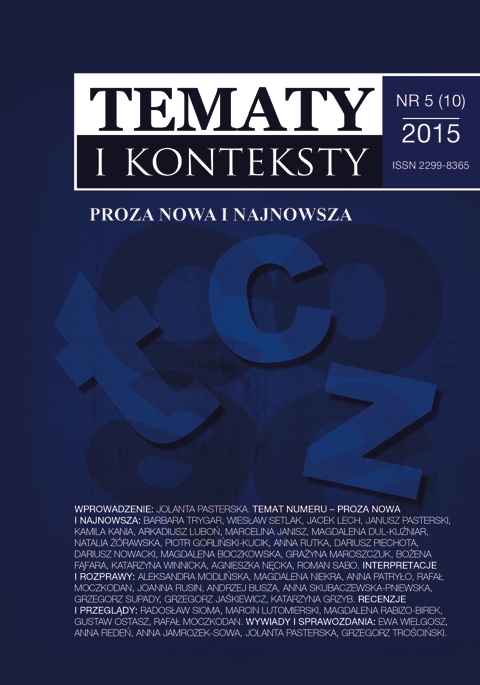
Proza nowa i najnowsza
Vol. 10 No. 5 (2015)It is a fact that, since the turning point of 1989, there has been a discussion on the face of
new prose. A specialist in literature, a critic and a reader face two main questions: what kind
of prose it is and how to read it. In the long term, in turn, questions concerning the ‘trend’
and the quest for new prose arise. In order to attempt to answer these questions, one needs
to pay attention to the causes and source/sources of the changes which can be found ‘outside’
the literature, and which are related to cultural, psychological, social and sociological transpositions. It is also important to determine the degree and direction of writing dependent on
them. The authors of the papers gathered in this volume have portrayed a wide panorama
of new prose and paid attention to both promising and less sparkling debuts. They have
focused on the transformations of Polish prose, its aesthetic, ethical and cognitive values. -
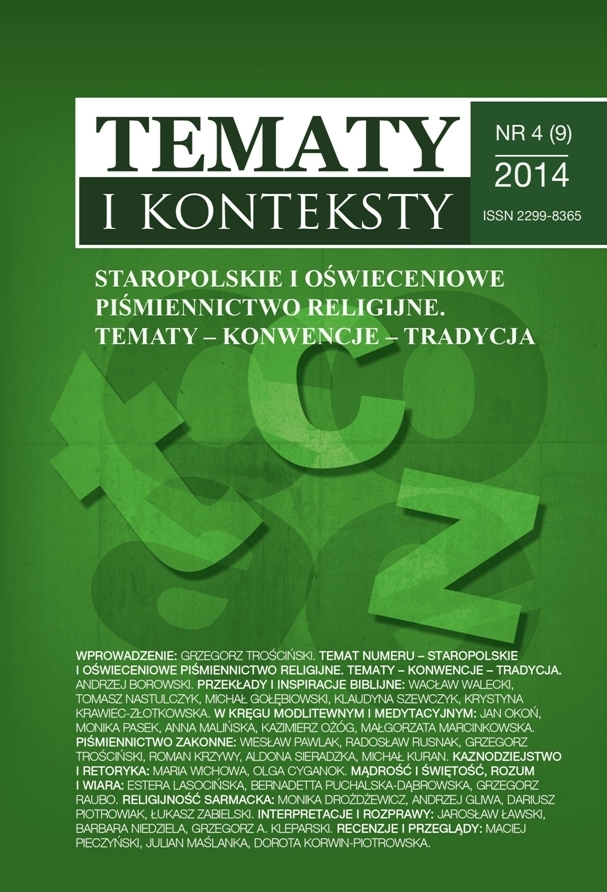
Staropolskie i oświeceniowe piśmiennictwo religijne. Tematy - Konwencje - Tradycja
Vol. 9 No. 4 (2014)The present issue of our journal is devoted to Old Polish and Enlightenment religious literature as well as themes and conventions of religious literature. The articles show a rich tradition of such works. The broad scope of topics demonstrates diverse literary research. The articles are devoted to defining such terms as "religious literature" and "religious poet", as well as to translations and biblical inspirations, prayers and meditations, monastic authors and their works, hymnals, sermons and the rhetoric, the matter of faith and reason, and a Sarmatian religion. The present issue of "Tematy i Konteksty" ("Themes and Contexts") also includes the papers devoted to interpretation of 19th century literature, reviews, reports and announcements. The authors of studies are scholars from a range of academic institutions in Poland.
-
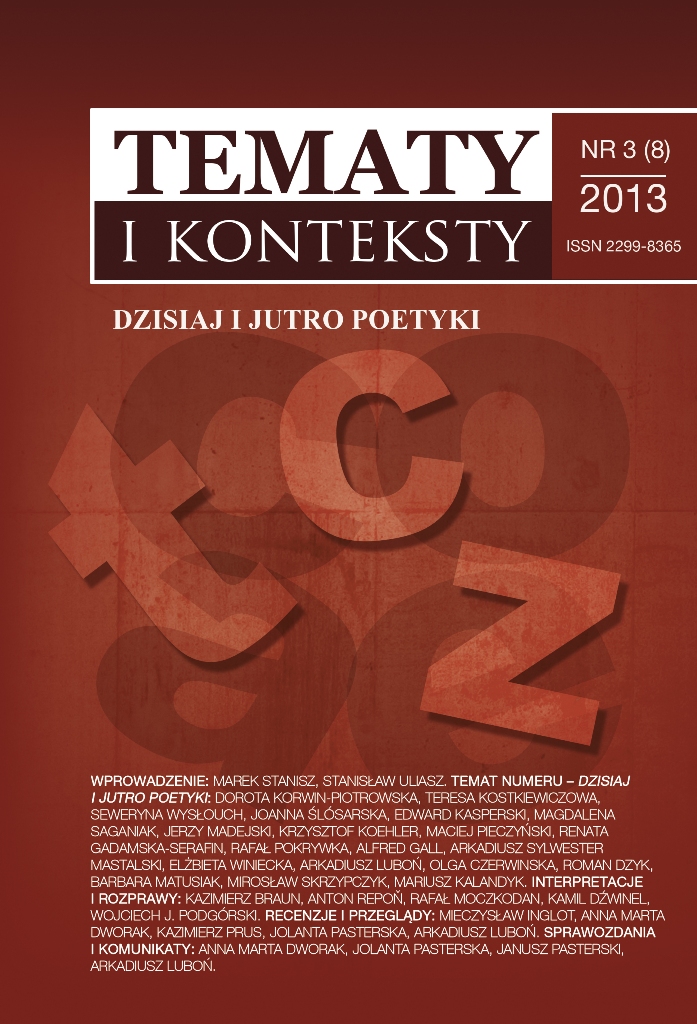
Poetics Today and Tomorrow
Vol. 8 No. 3 (2013)This issue features articles devoted to reflections on the state of poetics, both as a discipline within literary studies and as a subject of academic and school education. The articles presented here attempt to organize issues related to the philosophical foundations of the discipline, its competencies and potential for development, its boundaries and limitations, its status within other literary disciplines, and its functional dimension.
-
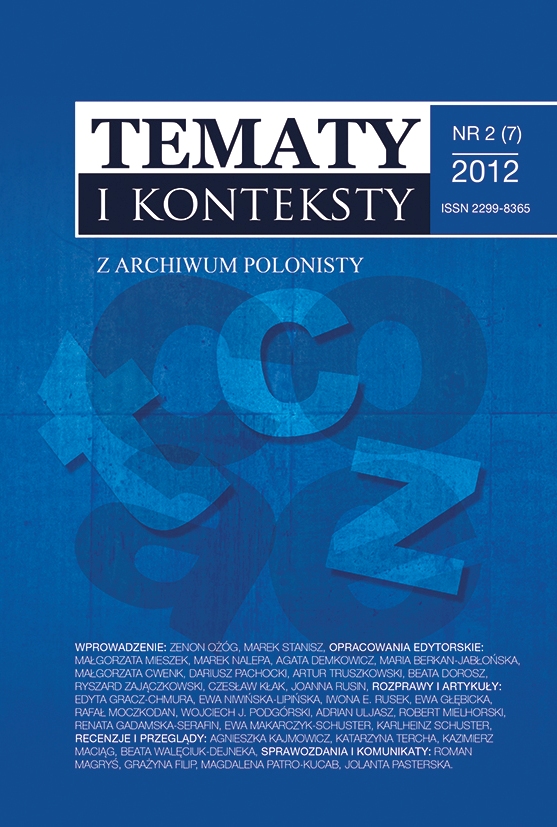
Z archiwum polonisty
Vol. 7 No. 2 (2012)Editorship and textology of literary works are fields with quite an ambivalent status. On
the one hand the range of trends presented in contemporary scientific life seem to lower their
prestige (it is enough to mention the requirements for rapid professional advancement or
the widely accepted principle of interpretational pluralism). On the other hand fundamental
editorial projects are constantly realized, also the popularity of Polish philology studies with
this specialty is increasing as well as the market demand for specialists in this field. The
latest issue of “Tematy i Konteksty” (“Themes and Contexts”) has been devoted precisely
to editorship and textology as well as works documenting Polish literary life in Poland and
abroad. The intention of the editors is to initiate reflection on the present state of Polish
editorship and the challenges it faces. -
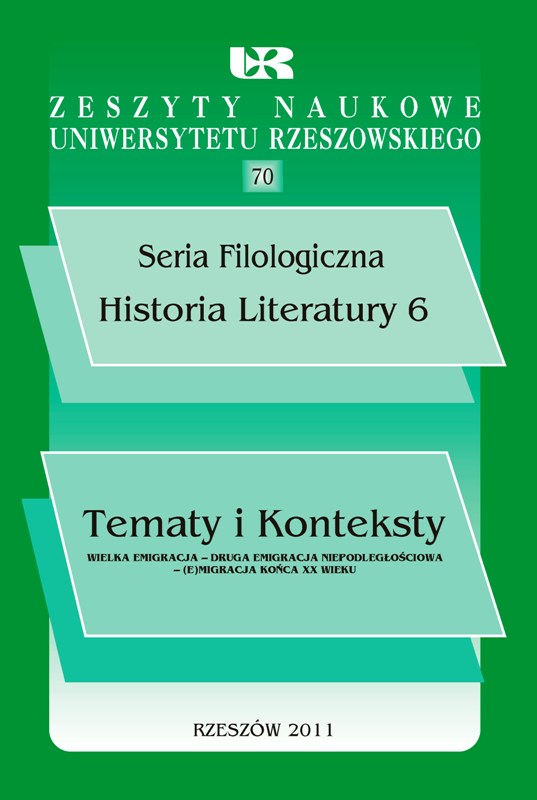
Wielka Emigracja - Druga Emigracja Niepodległościowa - (E)Migracja końca XX wieku
Vol. 6 No. 1 (2011)This issue is entitled "Themes and Contexts (History of Literature 6)".
ISSN numbers for this issue:
ISSN: 1643-0484
ISSN: 1643-0522

